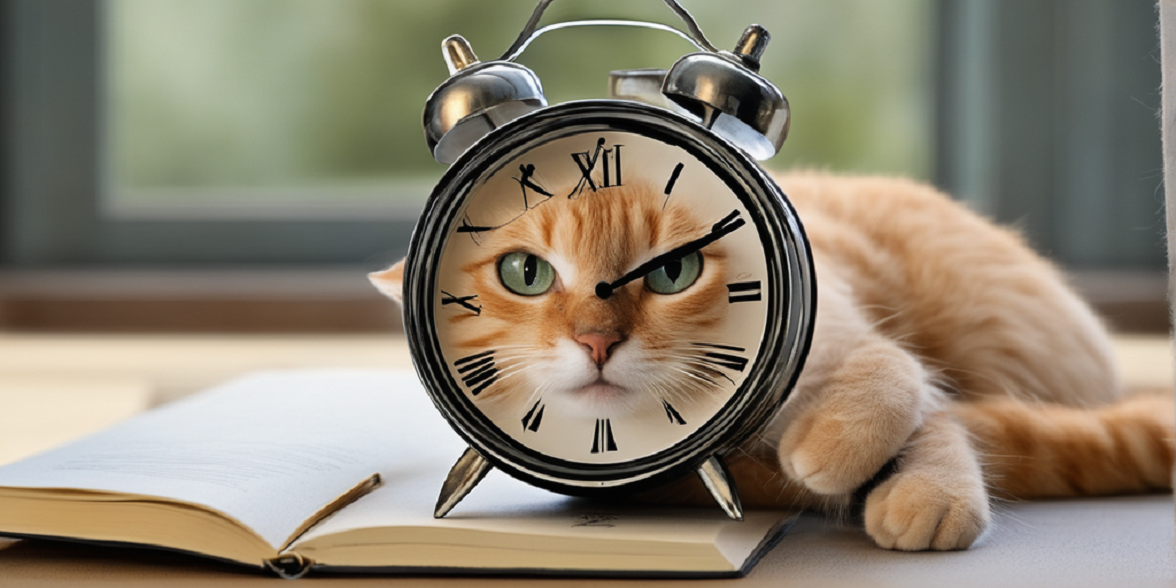In the quiet hours of the morning, when the world is still cloaked in darkness, and your alarm clock is set to snooze for a few more precious minutes of sleep, you may find yourself abruptly awakened by a furry, four-legged friend. If you’re a cat owner, you’ve likely experienced this phenomenon: your cat seems to possess an uncanny ability to wake you from slumber at the same exact time every day, demanding attention, food, or perhaps just some companionship. But have you ever wondered why your feline companion is so consistent in this wake-up call? In this article, we’ll explore the intriguing science behind why cats can be such reliable alarm clocks, even when we wish they weren’t.
The Instinctual Alarm Clock
Cats are natural hunters, and their internal clocks are finely tuned to their survival instincts. In the wild, they would wake up at the crack of dawn to stalk and hunt their prey. This instinctual behavior has been passed down through generations of domesticated cats.
Unlike humans, who rely on alarm clocks and schedules, cats rely on their internal circadian rhythms to guide their activities. These rhythms are regulated by a cluster of cells in their brains known as the suprachiasmatic nucleus (SCN). The SCN helps cats maintain a consistent sleep-wake cycle and is sensitive to changes in light and darkness.
The Power of Routine
Cats thrive on routine, and they quickly learn the schedules of their human companions. When your cat wakes you up at the same time every day, it’s likely because they’ve come to expect certain activities at that time. This could include feeding, playtime, or simply the comforting presence of their favorite human.
Cats are creatures of habit, and they find security in knowing what to expect. When they wake you up, they may be signaling that it’s time to stick to the routine they’ve come to rely on.
The Art of Communication
Cats are not only creatures of habit but also experts in communication. When your feline friend paws at your face or gently nuzzles you in the morning, they are sending a clear message: “It’s time to wake up and pay attention to me!” Cats are skilled at using body language and vocalizations to convey their needs and desires.
The Role of Hunger
Hunger can be a powerful motivator for cats. If your cat is accustomed to being fed at a specific time each morning, they may wake you up to ensure they don’t miss a meal. Cats have an incredible sense of timing when it comes to meals, and they won’t hesitate to let you know when it’s time to serve breakfast.
The Influence of Environmental Factors
Environmental factors, such as temperature and noise, can also play a role in your cat’s morning routine. If your cat is uncomfortable because the room is too hot or too cold, they may seek your attention to make necessary adjustments. Similarly, if there are loud or unusual noises outside, your cat may become alert and wake you up as a response to potential threats.
The Bond Between Human and Cat
The unique bond between humans and cats is built on trust, companionship, and affection. When your cat wakes you up in the morning, it’s not just about routine or instinct—it’s also a way for them to strengthen the connection they share with you. Cats often choose to wake up their favorite humans because they enjoy the interactions and attention that follow.
Managing the Morning Routine
While it’s endearing to be awakened by your cat’s gentle purring or playful antics, there may be times when you’d prefer to sleep a little longer. To manage your cat’s morning routine, consider the following tips:
- Adjust your cat’s feeding schedule: If hunger is the primary motivator, try shifting your cat’s mealtime to a later hour.
- Provide enrichment toys: Interactive toys can keep your cat engaged and occupied in the early morning hours, reducing the urge to wake you up.
- Create a comfortable sleeping environment: Ensure that your bedroom is conducive to a good night’s sleep for both you and your cat. Maintain a consistent temperature and minimize disruptive noises.
- Use positive reinforcement: Reward your cat for waiting patiently until your desired wake-up time. Treats and affection can reinforce this behavior.
Closing Thoughts
Cats are creatures of habit and instinct, and their ability to wake you up at the same time every day is a testament to their finely tuned internal clocks and their desire for routine and connection. While it may be frustrating at times, it’s also a reminder of the special bond you share with your feline companion.
So, the next time your cat serves as your purrfect alarm clock, take a moment to appreciate the fascinating science behind their behavior. Embrace the routine, enjoy the connection, and cherish the moments you share with your loyal and loving wake-up call, because, in the end, it’s all part of the wonderful world of cat ownership.



